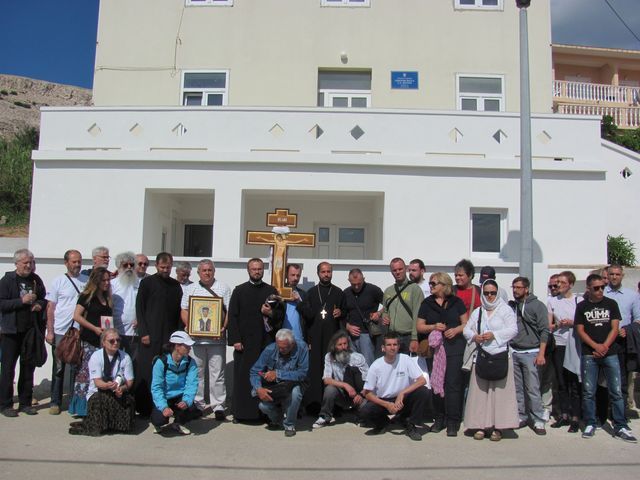Descendants of victims in front of the school in Metajna
An Israeli TV crew was prevented from filming a documentary about Ustaša concentration camps established at the beginning of the Second World War in Yugoslavia (1941) on the island of Pag in the bay of Slana and in Metajna.
On Saturday 5th of September, the residents of Metajna filed a complaint with the local police regarding “unauthorised” filming, as a result of which the police escorted the Israeli TV crew away from the island of Pag.
“This is yet another in a string of examples which show the consequences of the fact that the Croatian people, unlike the Germans for example, did not go through a cathartic process and never confronted this part of its past, but instead continuously seeks to erase and negate evidence of the crimes it committed” stated Dušan Bastašić, president of the “Jadovno 1941” Association, for SRNA.
He expressed his hope that the experience which the Israeli TV crew and descendants of the victims who were with them underwent would help to ensure that the truth about Slana and Metajna would finally be exposed as well as that the crimes committed there would not be forgotten.
In the company of the TV crew was Dani Novak, a 70-year old Jewish American, who stated for Croatian media that he had come to explore the place where his grandmother and aunt had been imprisoned. “I know that they were imprisoned in a house in Metajna”, he stated.
“Some of the local residents declared that nothing had ever happened there, while one of them, who came with his young son, told Dani Novak, whose grandmother and aunt were killed in that camp, that the claims about Metajna were not true and that he did not want his child growing up with such accusations”, reported Bastašić.
He stated that in the book “Haron i sudbine”, written and published in 1985 by professor Ante Zemljar, a Croat and anti-fascist from Pag, was a detailed description of the existence and functioning of the camp on Metajna, the first concentration camp for women and children during the Second World War, as well as other camps on Pag.
“In his book, Zemljar also provided copies and translations of original reports produced by the Italian military medical unit which, from 3rd to 5th September, following the closure of the camps, conducted clean-up operations at the site of the camps. They exhumed the bodies of the victims killed ahead of the Catholic feast-day of ‘Velika Gospa’ [Dormition of the Virgin Mary], in the night between 14th and 15th of August 1941” stated Bastašić.
He also stressed that Italian soldiers “very clearly noted that they had exhumed and then burned the bodies of 407 men, 293 women and 91 children under the age of 15”, adding that this was only a fraction of the total of 8.020 victims identified and documented by the historian Đuro Zatezalo in his study published in 2007.
A representative of the Jewish national minority of the City of Zagreb, Sanja Zoričić Tabaković, stated that the police initially confiscated the passports of the Israeli TV crew, but later “behaved very correctly”.
Vezane vijesti:
Hrvatska još ne priznaje paške žrtve
NA DANAŠNjI DAN ZATVOREN ZLOGLASNI LOGOR SLANA NA PAGU
NOĆ KADA SU POBIJENI LOGORAŠI NA PAGU I VELEBITU
NIN: Bez imena i spomen-obeležja
STRATIŠTA SRBA I JEVREJA NISU MJESTA ZA ZABAVU
Otvorene Čarolije ljeta – Izrael u Novalji
Kompleks Jadovno – Jadovno 1941.





 kolačiće
kolačiće